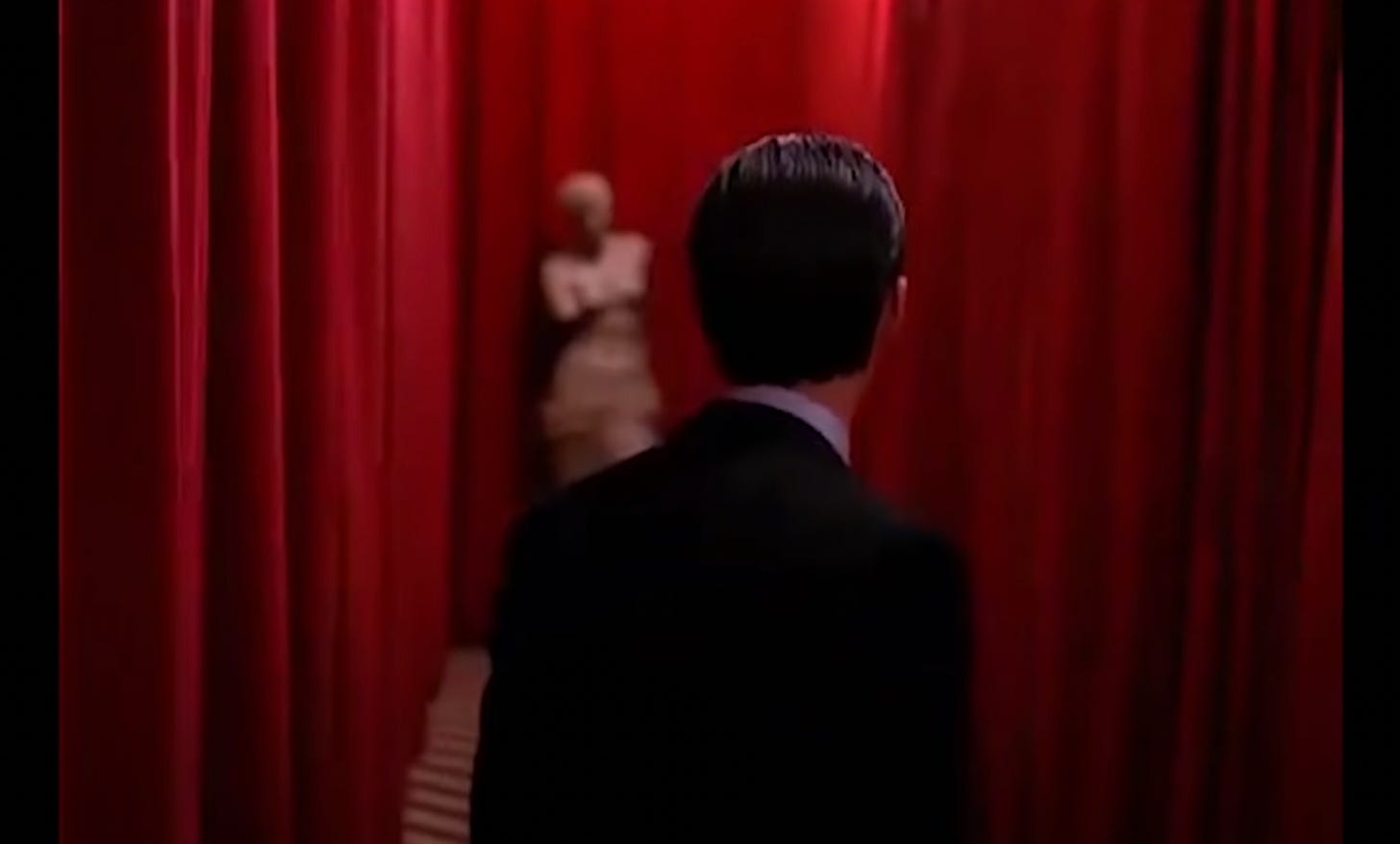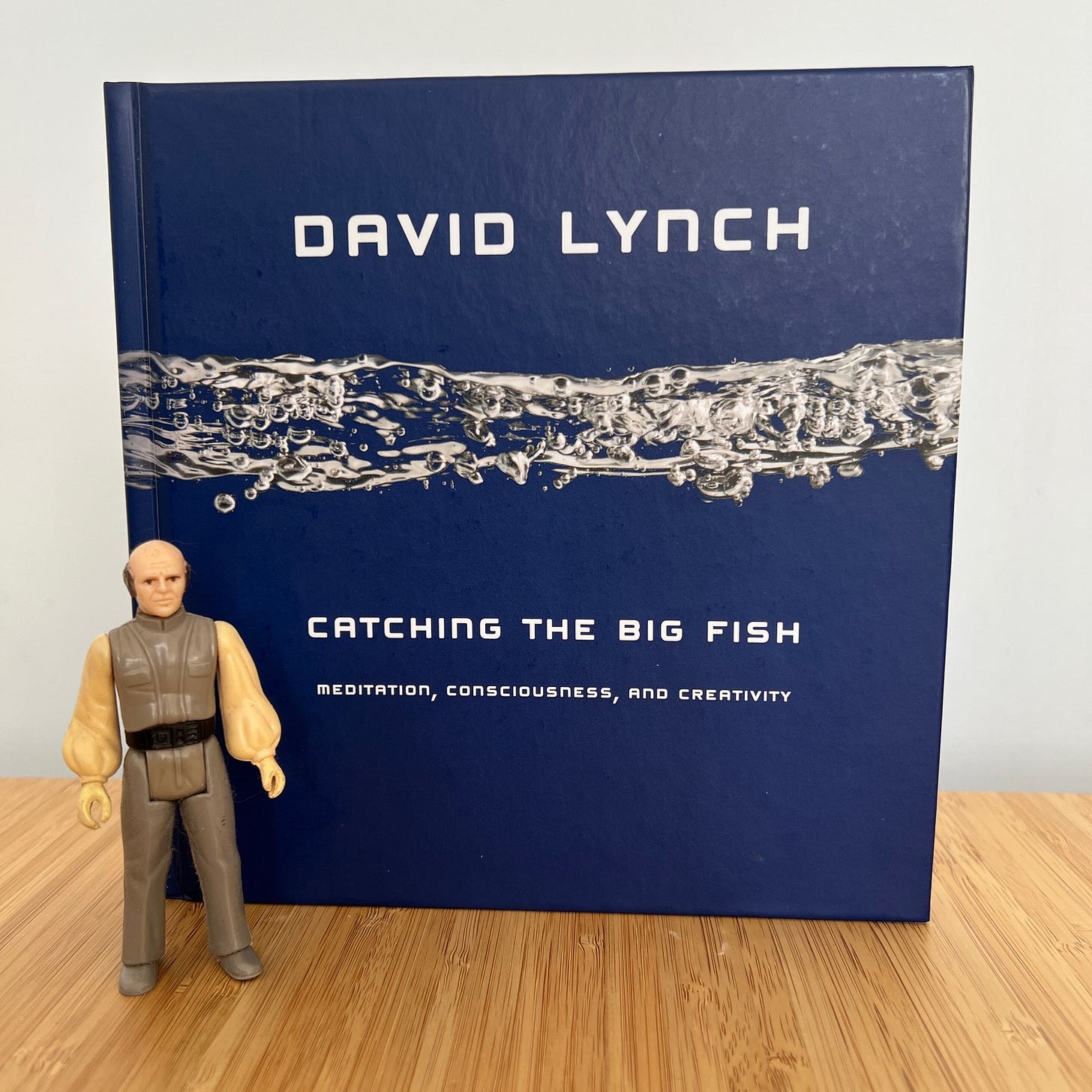This post is part of a monthlong series tied to our current book club pick, David Lynch’s Catching the Big Fish. Scroll down to RSVP to our Lynchian Zoom on Sunday, March 2!
I’ve seen four movies at the theater in the past four weeks. In 2024, the average person went to the movies 1.8 times all year — continuing a massive moviegoing dropoff that started during the pandemic.1
As I told Dean the other day, movie theaters are one of the only places where I can detach, decompress and think.2 I’m interrupted nearly everywhere else, whether by human or device. And not only does this constant distraction kill my soul, it kills my ideas.
In our new book club pick, Catching the Big Fish, David Lynch refers to the process of getting ideas as “catching fish.” The deeper you can go within yourself, the bigger fish you can catch.
Maybe you catch fish while roasting a chicken or whittling woodland creatures or jogging around a cemetery. Sometimes I catch them in the shower, at the nail salon or while walking across the Ninth Street Bridge.
When I leave a movie theater, I usually feel calmer, happier, maybe even inspired. I feel open to catching fish.
Lynch writes:
“It’s so magical — I don’t know why — to go into a theater and have the lights go down. It’s very quiet, and then the curtains start to open. Maybe they’re red. And you go into a world. It’s beautiful when it’s a shared experience. It’s still beautiful when you’re at home and your theater is in front of you, though it’s not quite as good. It’s best on a big screen. That’s the way to go into a world.
In the 1940s, the movies were the most popular activity in America, with many folks going twice a week or more.3 By the end of the decade, that number declined as people started leaving cities, buying homes, spitting out babies and staring at their new phones televisions.
Some have argued that moviegoing is dying because the films themselves are bad, or they’re too expensive — and maybe there’s a little truth in that, but I think it’s more because most people don’t want to a) share an experience with strangers; and b) put down their phones for two hours.
David Lynch writes about how certain things, like anger and depression and interruption, “are like a vise grip on creativity.” I’d add phones to that list.4 Being alone with my phone feels like suffering and despair. It is where my ideas go to die — and yet I just stopped typing to go look at it.5
January was rough for nearly everyone I know. The news, the weather, my bank account — all of it made me angry.
The other day I was riding the elevator with an artist.6 I told him how I’d barely written a word in January or, for that matter, experienced any creative achievement the entire month. He smiled.
“Well, no garden blooms all the time,” he said.
That gave me an idea.
where do you catch fish?
What place/activity lets you detach and think? Tell us about it as a comment or via email. Nothing is too boring or too strange.
rsvp to our book club discussion
Buy/borrow/please don’t steal a copy of Catching the Big Fish before we talk about it on Sunday, March 2, via Zoom. (It’s also available as an audiobook, read by David Lynch.)
RSVP here if you’d like me to send you the Zoom link.
See ya Friday!
losing (and gaining) it at the movies,
whit
In January, I saw Babygirl, The Room Next Door, The Brutalist & Born Innocent: The Redd Kross Story at the theater. I recommend them all!
Dean replies: “I feel that way at the Russian-Turkish bathhouse.”
Moviegoing reached its peak in 1946, when more than 80 million Americans (more than half the population) went to the movies every week.
Lynch was very against watching films on phones:
On average, we look at our phones 58 times per day.






Sometimes I can detach by just laying in the yard and staring up at the sky.
I think about this Paul Auster passage all the time:
--------------------------
From City of Glass (1985):
"More than anything else, however, what he liked to do was walk. Nearly every day, rain or shine, hot or cold, he would leave his apartment to walk through the city - never really going anywhere, but simply going wherever his legs happened to take him.
New York was an exhaustible space, a labyrinth of endless steps, and no matter how far he walked, no matter how well he came to know its neighborhoods and streets, it always left him with the feeling of being lost. Lost, not only in the city, but within himself as well. Each time he took a walk, he felt as though he were leaving himself behind, and by giving himself up to the movement of the streets, by reducing himself to a seeing eye, he was able to escape the obligation to think, and this, more than anything else, brought him a measure of peace, a salutary emptiness within. The world was outside of him, around him, before him, and the speed with which it kept changing made it impossible for him to dwell on any one thing for very long. Motion was of the essence, the act of putting one foot in front of the other and allowing himself to follow the drift of his own body. By wandering aimlessly, all places became equal, and it no longer mattered where he was. On his best walks, he was able to feel that he was nowhere. And this, finally, was all he ever asked of things: to be nowhere."
More times than not I experience the opposite of your much coveted "detach, decompress and think" mandates at the movie theater where people talk, consult their phones, etc./etc. Constant interruptions. Go to a theater that serves food and drinks and your third act is diminished by movie theater waiters getting everyone to pay for their dinner or lunch. I hardly ever go to the movies because people can't seem to immerse themselves like they used to. I prefer to watch movies on my big screen TV with excellent sound -- alone on my couch.